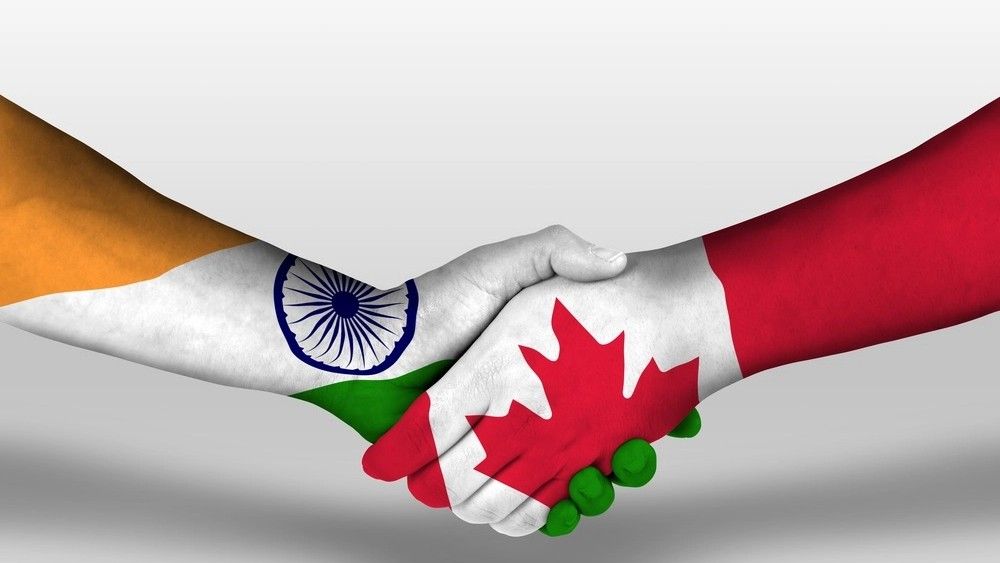
Can US President-elect Donald Trump help sweeten the soured ties between India and Canada? Judging by the recent violence in Brampton, the ‘Brown Town’ of the Greater Toronto Area, it’s a tall order. Khalistani separatists, the major outstanding issue between the two countries, appear to wield extraordinary influence over the Canadian state.
The attack on the Hindu Sabha temple in Brampton at the start of the official ‘Hindu Heritage Month’ can be at least partly attributed to Canada’s fostering of radical elements, a flawed and counterproductive strategy that has inevitably led to turbulence. It has proved to be a major embarrassment for Canada, more so because an off-duty Toronto police sergeant participated in the violent anti-Hindu demonstration. The cop in question had attended pro-Khalistan events in the past, a former police sergeant has been quoted as saying. This implies that the erring official’s bosses knew of his affiliations. He has now been suspended, but the incident has given credence to claims that Khalistan supporters have infilterated the Canadian state.
For the Indian tourist, the ‘Free Khalistan’ slogans emblazoned on sidewalks in Brampton are a blast from the past, a long-dead conflict transplanted on foreign soil. A separatist campaign that has zero traction in Punjab and few takers among the Sikhs of Toronto has received de facto support from the Justin Trudeau dispensation.
Canada once prided itself on being the safest country for immigrants. That reputation now lies in shambles. The Hindu diaspora in Canada is palpably fearful, as are Sikhs who do not support the ‘cause’, but dare not speak out for fear of reprisal. They point out that India moved on from separatism decades ago, but the handful of Khalistani radicals who immigrated in the 1980s and 90s are caught in a time warp. And they have a voice in the Canadian government that is far out of proportion to their numbers.
Threats that were once dismissed as bluster – such as US-based separatist Gurpatwant Singh Pannun’s warning that Hindus must quit Canada and vandalism in temples – have now taken on a new and unnerving reality. Nor is Canada a safe posting for Indian diplomats, if we go by Verma’s statement that he was physically threatened by armed militants in Alberta. It is worthwhile to note that the Indian diaspora in Canada has become increasingly diverse and is no longer predominantly from Punjab. This fact may have led to increased anti-Hindu activity by separatists and their supporters.
An added fear is that the Brampton attack, followed by a gathering of armed demonstrators outside another Hindu temple – mercifully dispersed by the police – will fuel anti-immigrant and racist sentiment in Canada. Already, anti-immigrant outpourings on social media after rambunctious Diwali celebrations are calling out the Canadian government for ‘breaking’ the immigration system and demanding a return to a ‘white Canada’. Racism is more evident in areas where the ‘browning’ of the population is visible.
Canada has arguably broken the unwritten rules of diplomacy, in publicly naming Indian High Commissioner Sanjay Kumar Verma as a ‘person of interest’ in the killing of a Khalistani separatist leader in British Columbia, covertly surveilling Indian diplomats, holding a moment of silence for the slain separatist in the House of Commons, and accusing the Indian Home minister of orchestrating a campaign of “violence and intimidation” against Canada-based separatists.
Trudeau is clearly not interested in defusing tensions. After the mutual expulsion of six diplomats each by both countries, it has upped the stakes by naming India as a ‘cyber adversary’ and stating that the remaining Indian diplomats in the country are ‘on notice’.
In this scenario, can Trump make a difference? Pro-Republican Indian Americans hope that he will “crack down” on Khalistani separatists. But that’s hardly likely to be a priority, regardless of his recent reference to the Indian PM as a “friend of mine and the nicest human being”. The fact remains that Canada, while it has yet to present any evidence of Indian involvement in the killing of a Khalistani separatist on its soil, has cited the US indictment of former Indian intelligence agent Vikas Yadav in a failed assassination attempt on Pannun, to bolster its case.
Besides, the US and Canada have clear double standards vis-a-vis India, at least as far as nuclear proliferation, human rights and extremism are concerned. The US targeted terrorist Osama bin Laden on foreign soil, after which the then CIA director was quoted as saying that Pakistan was deliberately not taken into confidence. Its ally, Israel, has a long history of assassinations of terrorist leaders and their supporters hiding out in other countries, including in Europe. Wikipedia, under the heading ‘List of assassinations by the US’, has an exhaustive list of targeted killings allegedly conducted under official sanction. Another entry on the site is titled ‘CIA assassination attempts on Fidel Castro’ (famously slipping him an exploding cigar in one instance).
And yet, Canada’s moral outrage over an extra-judicial killing – one that has yet to be proven – is confined to India. Domestic politics, and a disapproval rating of 65% for Trudeau may have something to do with it. If Canada’s ties with India, cordial for the most part since the early 1990s but at an all-time low under Trudeau, are to be restored, we might just have to wait for another election – this time in Canada.
Bhavdeep Kang is a senior journalist with 35 years of experience in working with major newspapers and magazines. She is now an independent writer and author